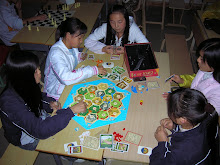One interesting aspect of teaching students in rural Guizhou is that very few people enter the college English department with an English name. It falls on the foreign teacher to provide the students with a name - a task that I learned to pass on this year. Sure I had the opportunity to give names to students who are now my friends, making their names more special. But the process was dreadful.
"Sandy... what does it mean?" one student asks.
"Ummm..." I reply, dumbfounded. Actually, unless you ask me what my own name means, I have absolutely no idea about name origins or meanings. And I suspect, to some extent, neither does anyone else in America.
The back-story for Chinese names could probably go on forever (almost), but there are some general differences between Chinese and English names.
My brother's name in Chinese is 艾论,which probably means something like "handsome talker,"but, more importantly, phonetically represents my brother's name using Chinese characters (AiLun - Aron). It's not a perfect phonetic translation because there are many sounds in Chinese that don't exist in English and vice versa. This is the main reason people have accents: they approximate sounds they cannot say by using something close in their own language (Hence: Flied Lice).
So I'm standing there after class and the students have a barrage of questions: "Which English name means 'flower?'"
"Which English name sounds strong and also means clever?"
"What does 'Garth' mean?"
Again I respond:
"Ummm..."
To make it simple I will put it like this: Chinese names are much easier to understand because they are like Native American names. I don't mean that they are names about nature, but that they have a strong relationship with words that are used in everyday speech. An example would be the Native American name, "Running Bear." If we break these apart they will but used in everyday speech. 'Running' and 'bear'.
It's a little more difficult in English. For example: David.
Of course we have 'Dav,' which means ?, and 'id,' which is part of the subconscious.
You see my point? They are words that are derived from other languages and different traditions, rather than one long, continuous history. Sure we could trace 'David' back to Hebrew (and maybe farther than that), and we might even find the words represented by the name. But today it's not so easy - especially when the name is not your own.
Chinese names are broken into two parts: Family name and Given name (in that order). The family name is one character. The 3 most common Chinese family names are: 王 Wang (wong), 李 Li (lee), and 张 Zhang (jong). Tracing these names is probably similar to tracing English surnames, as these names are often related to where someone is from (I think).
Given names are simple, I think. Here are a couple names (family name included)
张美丽 (Zhang Beautiful)
王云超 (Wang Exceeds the Clouds)
The given names can often be broken apart to have meaning (云 means cloud), so it's no surprise when a Chinese student mistakenly takes us for name experts.
My Chinese name was taken from the phonetics of my surname, Ooley. In Chinese is is pronounced /ou lei/ and written 欧雷. My new "family" name is 欧,which means 'Europe,' and my new "given" name is 雷, or, 'thunder.' Though people don't typically combine their family name with their given name to understand the meaning, doing so with my name yields, "Thunder over Europe."
Russia beware.
12.09.2008
Subscribe to:
Post Comments (Atom)








No comments:
Post a Comment